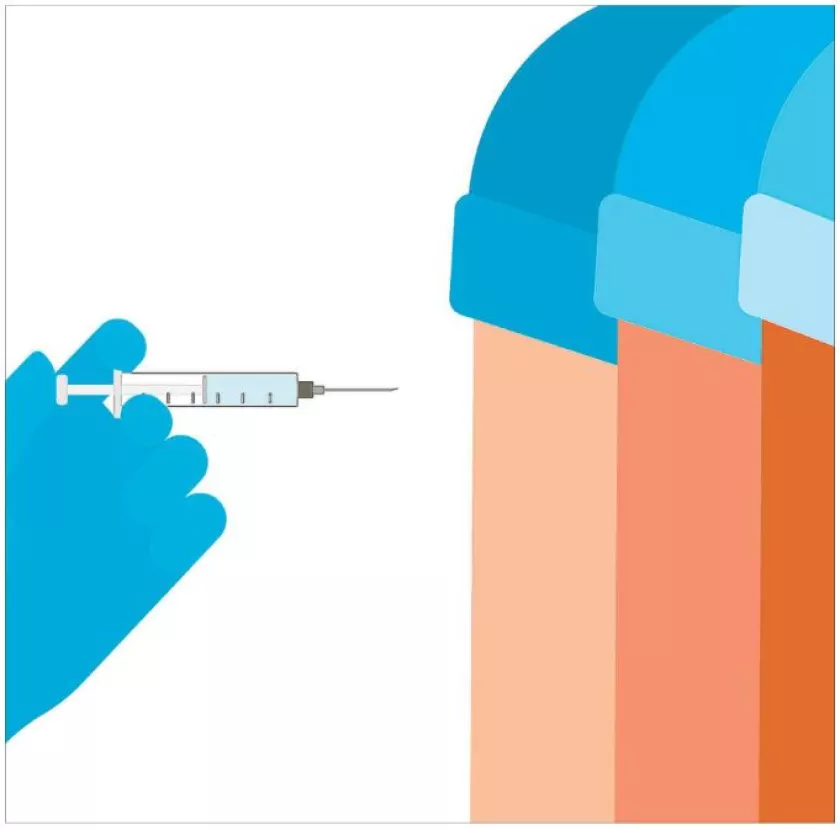A trauma-informed approach is needed to move some vaccine-hesitant individuals from a fight, flee or freeze state to one of comfort, confidence and action.
Nash is principal of Nash & Associates and a senior development consultant to the San Diego Refugee Communities Coalition. She lives in South Park.
The race to vaccinate as many people as possible, and as soon as possible, has created challenges and opportunities for grassroots organizations working with marginalized populations. Many have firsthand knowledge of how experiences of individual or collective trauma can create a sense of fear and mistrust of authority and influence decision-making.
As a result, some of these organizations are now adding “trauma-informed” as a best practice approach to building confidence in government led COVID-19 vaccination efforts and making progress because of it.
The San Diego Refugee Communities Coalition is made up of 11 ethnic community organizations working with populations whose primary languages would be unfamiliar to the average American — including Tigrinya, Karenni, Haitian Kreyol, Pashto and Dari. But language is only one barrier to accessing public health services. Layered on top of that are experiences of discrimination, persecution, and a myriad of social and economic stressors. These barriers and stressors are not new. What is new is the political will to address the disparities and conditions that predate COVID-19, and which are driving lower vaccination rates among the Black, Brown and immigrant communities.
San Diego Refugee Communities Coalition members know that a heavy-handed, guilt- and shame-driven approach for vaccinations will have limited success. In fact, such an approach could put at risk the hard-won trust we have built over decades of front-line service. What we believe will work is a community engagement model that doesn’t dismiss the role that past or current traumatic experience plays in shaping responses to the pandemic. People who have had close family members deported are not lining up at government run vaccination sites. Families who have had health issues held against them in their immigration process don’t want to risk a positive COVID-19 test or side effects from vaccination. Individuals who have firsthand experience of abuses of power don’t know whom to believe or whom to trust.
Our coalition members believe that a trauma-informed approach, which incorporates linguistic and cultural competency, is needed to move some vaccine-hesitant individuals from a fight, flee or freeze state to one of comfort, confidence and action.
A trauma-informed approach means respecting the well-founded reasons for mistrust and hesitancy, and meeting people where they are in their questions and fears. Trauma-informed practices include providing information regarding which vaccine is being administered, providing a peer navigator to be on hand as needed, creating private vaccination spaces for women and children only, addressing non-COVID-19 basic needs, and establishing a welcoming environment.
Funded by foundations, the county and state health agencies, the San Diego Refugee Communities Coalition’s peer-based workforce is equipped for the job at hand. Our entire workforce of more than 40 full and part-time staff members is bilingual and collectively cover 26 languages and dialects. All are members of the community they serve. They shop at the same ethnic markets, attend the same mosques and churches, and have shared experiences of what it takes to navigate the ups and downs that come with building a new life in the United States.
Partnering with local clinics, health-care providers and faith-based organizations, we have been hosting vaccination events since May, and have vaccinated over 1,600 of our community members so far. Each event is focused on a particular refugee or immigrant community. In late July, more than 100 members of San Diego’s Haitian community came to a vaccination event in the parking lot of the Haitian Methodist Ministry. Community Health Workers from Haitian Bridge Alliance greeted families with self-care packages, diapers, children’s books and clothing, Haitian soda and food. Haitian Kreyol-speaking community support navigators from the state’s CalHOPE Program were on hand to provide information about resources and programs, answer questions, and dispel vaccination related rumors and myths. Similar events, that pair vaccinations with bundled services and resources, happened this past weekend for Afghan, Iraq, Syrian, Sudanese and Somali Bantu communities, and additional events are planned monthly for other communities.
As the U.S. sees a rise in COVID-19 case rates and hospitalizations, public health departments and their community partners across the country are ramping up efforts to continue getting as many people vaccinated as possible. Trauma-informed practices of understanding, empathy and caring may be the best way to get some people across the finish line.
Read the article in the San Diego Union Tribune: https://www.sandiegouniontribune.com/opinion/commentary/story/2021-09-01/vaccine-hesistancy-refugees-minorities

Recent Comments